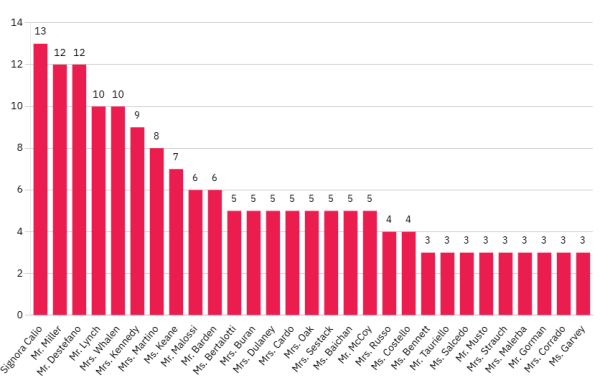Where Do BHS’s Priorities Lie? In Grades or Students?

Imagine walking into Bethpage High School and seeing plush, comfy couches all around the building; pianos, ping-pong tables, and pool tables in common areas; and student cafes where students can just hang out, relax, and maybe drink some decaf.
Fortunately for Finnish students, this is no dream. However, the American reality is this: once the obnoxious bell blares, all you see are peers shuffling through the hallways with only four short minutes to rush to their classes. No breaks. Nothing to look forward to but the final bell. How bleak.
In October of 2015, the Council of Great City Schools concluded American students will take 112 standardized tests before they graduate. Is this too much? And more importantly, does Bethpage School District concentrate on performance instead of students’ well-beings?
According to Mrs.Vera, BHS psychologist, “Our education here in the United States has really lost sight of whole individuals versus just focusing on test scores—as a number, competition, or ranking. We’ve lost that human element. And that applies as a country, and not just here at a BHS.
However, Ms. Vera added that having, “Our new principal Mr. Jantz has a very strong- student centered approach to things, and outs student well-being as a top priority. I think he will be a good influence in creating a whole-child learning environment at BHS ”
Inescapably, school systems and behaviors are determined by politics. Nevertheless, this shouldn’t be justification to remain conservative and conceal the issues we face. Students notice the attitude and the tone schools apply. Is BHS producing any positive energy regarding their priorities?
Erica Marciante, a junior at BHS, said, “When I get a good grade, it affects me for five minutes, and then I’m kind of over it. But when I get a bad grade, it affects me for literally days. Obviously, depending on the severity of it or where the class is, especially if you’re in the lower percentile of how the class did. But with knowing where you are, you are subconsciously comparing yourself to everyone else.” This suggests the severe psychological impact grades have on students emotionally.
Mrs. Vera also added, “There is a certain amount of stress that motivates us and pushes us to perform. But, if you pass that level, then [performance] diminishes. That’s when you see the difficulties, where people show anxiety, and suffer panic attacks and the true inability to perform.”
Our very own BHS psychologist then offered several tips on how students can cope with the stress, saying, “Keeping grades in perspective is the first step. Remember, there is so much to being a person. And there are so many skills that can define a person outside an academic grade.” She continued, “Mindfulness is another thing. I practice mindfulness daily. I think it can help everyone be brought back to the present moment; the here and the now. To keep yourself calm and centered, and not to be swept up in stress and anxiety.” Furthermore, she gave Ms. Bennett a shout-out on how she is doing a wonderful job with meditation and yoga.
Isabelle Yoon, a sophomore student here at BHS, added the way she deals with stress: by “taking naps and watching TV.” She then pointed out, when she sees “people going through their own problems, it distracts me from mine.”
Ms. Vera also pointed out how Finland is the happiest country in the world. Besides that, it is the fifth smartest. Here the correlation is evident. Perhaps, BHS should try looking at it from a different angle. Instead of putting emphasis on education and the quantitative aspect, we should focus on the student as a whole, and then everything else will fall in place. It sure is working for Switzerland, Canada, Netherlands and other countries.
In addition, Ms. Vera feels that grades and tests have their place. “But I think we as a country, and we as a school, and we as students need to stop talking about so much about Regents’ exams and start talking about other things that make up a school experience being crucial in the school experience.”
Dr. Michael Hynes, superintendent of Patchogue-Medford School District, personally traveled to Finland to do research about what they are doing right and what we are doing wrong. Finland is famously the top-performing country in the world in terms of education.
During our phone interview, Dr. Hynes said, “The Finnish teachers trust their students first and foremost. They treat them all with respect, like adults.”
In addition, besides college being free, the school staff “gears and caters towards a child’s or a students passion, and what they want to do. If they choose not to go to college, they are not looked down upon. It’s not like youŕe ´less than,’if you choose to go a different pathway.”
Dr. Hynes: “We ask kids to do too much. We tell you how youĺl do it, meaning that you don’t have choices. For the most part, teachers and administrators and parents tell you what to do from the moment you wake up to the moment you go to bed. There is very little time for you have to have down time, and for to do things that you want to do… There is that constant pressure, and I can’t think of any other group in humanity that starts their day at 6:00 and potentially don’t end up in 11:00 at night.”
Furthermore, in Finland “there are no standardized tests [meaning no regents or AP exams]. They are not teaching to the test, like here. The students are learning for the learningś sake. The amount of homework high school students have in Finland is not even close to here… Our high school kids are lead to believe they should not take lunch, and take another AP course instead. And that’s just crazy. Because it wasn’t always like this. And the problem is, I think, that some guidance counselors who perpetuate that, there are some parents who perpetuate that, and there are some colleges that perpetuate that idea.”
Surprisingly, there’s more than just those factors to distinguish our schools from Finnish schools. “When you walk into a Finnish High School, they get three 15 minute breaks a day,” Dr. Hynes explained. “And they can do whatever they want.”
Agreeing with Mrs. Vera, Dr. Hynes said, “I think there is a big difference between productive stress and toxic stress. And I think schools do a very good job of producing a lot of toxic stress. One out of every five American high school students have strongly considered suicide. That has never ever been the case ever, with any generation before. This is unprecedented. This has never happened before, and there are reasons.”
Ending the interview with this final thought, Dy. Hynes said, “If students spend 14,000 hours in school, why not gear those 14,000 hours toward drawing out your talents and potential.”
In essence, if Bethpage High School really wants us to succeed, both mentally and academically, then we need to start making change.
Until, then… we are all going to suffer.
Anastasija Petrovska, often referred to as Ana, is a sophomore at Bethpage. She is Macedonian, born and raised in Queens, and moved to Long Island a year...









